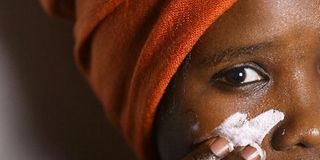ONGAJI: We need to talk about colourism

A lady applying skin lightening cream on her face in this posed photo. There should be a systematic overhaul to repair the damage colourism has brought to black women. PHOTO | FILE
What you need to know:
- You don’t have to go far to get the harsh reality dark skinned women face
- The truth of the matter is that society is to blame
- Skin colour privilege is a reality in Africa
Perhaps you have come across a widely shared short video clip showing how a certain unspecified chemical is claimed to be shedding off the skin of a black woman, thus making her “white”.
In that clip, a half-naked woman is seen immersed in a basin containing that chemical, as another woman demonstrates to the audience how it works. “Instant body wash and very effective,” she speaks in an accent.
The authenticity of the video cannot be proven, but just by the comments and views of many, the clip was received with backlash and disgust, with many wondering how one could be foolish enough to shed her “beloved beautiful black skin”.
But a comment from a certain gentleman drew my attention. “Africans will not stop bleaching because we don’t like our dark skin. We call very dark skinned Africans terrible names, while we show admiration for light skin” he said.
CONTROVERSIAL
Though controversial, it is the truth of the matter. I am a member of a certain beauty group where women have a platform to share beauty tips and also seek advice about the same.
A few months ago, where a lady; a group member, posted her photo seeking comments on her makeup skills. Instead, she was met with insults and offensive comments mostly about her dark skin colour.
“Cheusi mang’ara huyo hapo,” one said these offensive Swahili remarks, usually directed to dark skinned people, especially in Tanzania.
I got mad but then came to understand that they are not the only ones. This is the harsh reality dark skinned people and especially women face; insults from their fellow black people themselves.
It has been systemised in that until recently, most billboards, beauty product advertisements and even careers across the globe had been pegged on good looks - even here, in Kenya, very few featured dark skinned women.
This unfortunately conditioned many into thinking that beauty actually is indeed being light-skinned. And that is why we have socialites boasting of having used millions of shillings in going through expensive skin lightening procedures, terming it as an investment.
You don’t have to go far to get the harsh reality dark skinned women face. Here in Kenya, the infamous ‘rangi ya thao’ saying that has equated light skin with being endowed with a gold mine that allows one and especially women to get into deep pockets of rich men.
We see colourism through the works of some artistes, where in their music videos they parade women from other races, or light skinned black women, who in most cases have bleached their skin.
We have heard stories of Nigerian actresses who have admitted to have bleached their skin to get more roles.
In Jamaica, it is believed that being a light-skinned musician, increases your prospects of succeeding. Some argue that it is the reason why Bob Marley had an upper hand over Peter Tosh. It is also believed to be the reason as to why Vybz Kartel had to bleach his skin in an attempt to make it in the music industry, despite having already making a mark through his initial deep and thoughtful content.
Our own Lupita Nyong’o has also said how at first she had to struggle for roles here in Kenya because of her dark skin.
One time, a local TV anchor revealed how at first, as a dark-skinned woman, she struggled to make her presence felt, despite being one of the finest TV journalists around.
It’s not just them. This is the struggle of every dark skinned woman not in a foreign land, but here in Africa. You really have to be a strong, dark-skinned woman to go through that, and not even think about “shading your skin”.
NO MORAL AUTHORITY
Then we ask ourselves why; when studies reveal that 70 per cent of Nigerians are believed to have bleached their skin, or when a video clip of a group of Jamaican women admit to continue using harmful skin bleaching agents, or when we watch a documentary of a number of South African women suffering the effects of years and years of using chemicals to lighten their skin.
We ask ourselves why, when the illegal Latema Road skin-lightening industry continues to flourish despite the dangers associated with using these products.
The truth of the matter is that society is to blame. We have no moral authority to continue pointing figures at women and even men who continue to bleach their skin, while we fail to address the issue of colourism.
It’s not just about posting about your love for black skinned women or immortalising melanin in songs, there should be a systematic overhaul to repair the damage colourism has brought to black women.
Skin colour privilege is a reality in Africa, and a war against these harmful products will only be won if we emancipate ourselves from this foolish thinking, and teach our girls and even boys; straight from lowest education level, that beauty has nothing to do with skin colour.
If that were the case, then we black people would be the ugliest since we are the darkest skinned people as compared to other races. And I don’t think that is the case!





